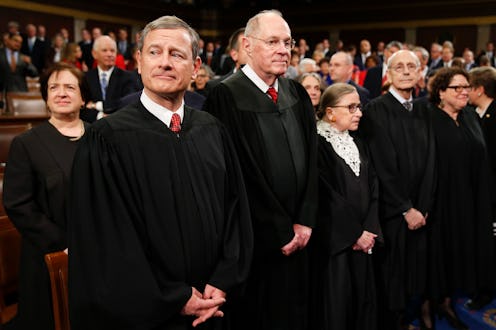News
What's Keeping SCOTUS From An Immigration Decision
Questions of constitutional integrity and the ideologies therein frequently divide the Supreme Court — and when immigration policy is on the table, that division line is embedded very deeply into the ground between each side. The fact of the matter is, SCOTUS' decision on immigration could drastically affect President Obama's legacy on immigration issues, so a swift resolution in the president's favor would benefit him immensely — not to mention potentially aiding the 11.3 million undocumented immigrants in America. It is a matter of great concern for many, so what exactly is keeping the Supreme Court from deciding on Obama's immigration actions?
For a little background, the president had announced his immigration reform plans toward the end of 2014, as a response to overwhelming congressional lethargy on the matter. After Texas and 25 other states filed lawsuits, the federal court elected to block President Obama's plans. As a follow-up in 2016, conservative justices like Chief Justice John Roberts and Justice Samuel Alito challenged President Obama's authority to employ executive actions in shielding approximately 4.7 million undocumented immigrants from deportation, according to Newsweek, which would have provided these immigrants the right to work in the U.S. legally.
Essentially, SCOTUS is undecided as to whether or not the Obama administration can use executive action, and by extension, they have one big question to debate: whether states have the legal right to bring the case to court and sue the federal government. If the states in question can persuade a majority of the Supreme Court's justices, the court might dismiss the president's recent immigration policies entirely. As for the president, he seems certain of his own legal abilities, but conservative justices are not sold.
Curiously, Chief Justice Roberts is known for his history of limiting who can bring challenges to court. On Monday, he revealed some reservations about the states' case against the federal government, but whether or not Chief Justice Roberts would ultimately dismiss said case remains uncertain.
Despite the states' challenge, some sources also claim the prognosis is not good for the president. Chief Justice Roberts and Justice Alito appeared particularly interested in the legal language in the administration's program guidance, which states that potential recipients are "lawfully present." According to Healthcare.gov, this refers to immigrants who have "qualified non-citizen" immigration status without a waiting period, or humanitarian status or circumstances (including Temporary Protected Status, Special Juvenile Status, asylum applicants, Convention Against Torture, and victims of trafficking). The two conservative justices suggested this would contradict current immigration law, which has a much more stringent classification of accepted immigrants.
Contrarily, the Obama administration actually argues that the program serves as a means for prioritizing undocumented immigrants in regard to who is spared from mandated deportation. To deport all undocumented immigrants would prove not only functionally difficult, but costly. The government has never deported over 500,000 undocumented immigrants in any year, and it is typically far fewer than even that.
Liberal justices, like Justice Ruth Bader Ginsburg, agreed with the program, stating that because there are 11.3 million undocumented immigrants in the U.S., and Congress has provided funds to remove only just over 4 million, deportation is not a viable option. Justice Sonia Sotomayor agreed that there are not enough resources to deport all undocumented immigrants, so alternatives like the president's reform plan are crucially necessary.
To round this all up: if 25 states attempt to sue the federal government over immigration law, and that big question on SCOTUS' task list about whether they're allowed to do so reaches a resolution in favor of those states, it could mean potential deportation for at least 4 million undocumented immigrants.
Will this debate pan out for President Obama, or could half of the country's state representatives sway the nation's highest court in their favor? At this point, the divide is deep-seated and not going anywhere.
